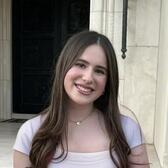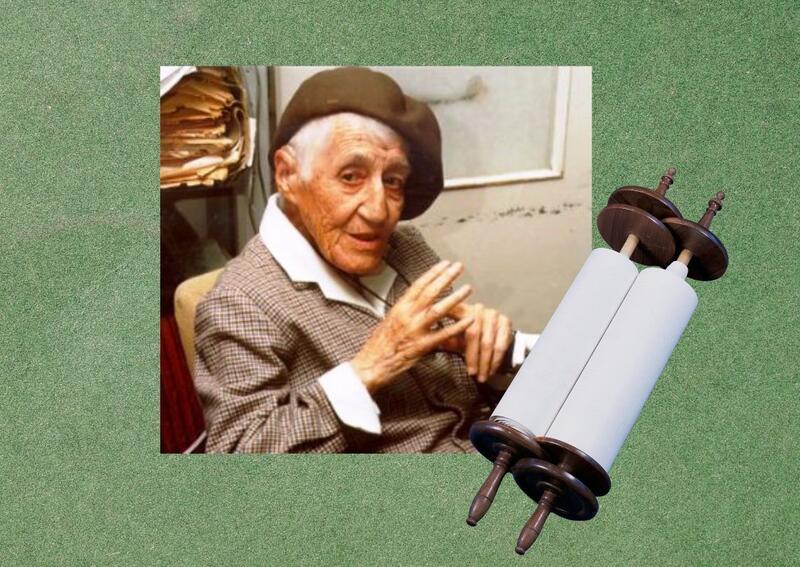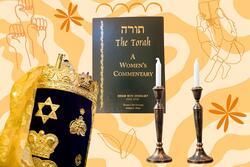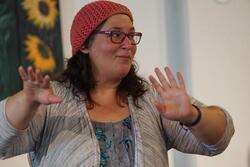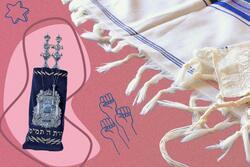How Nechama Leibowitz Helped Me Reclaim Torah
I sat with my legs tightly crossed, my navy uniform skirt brushing my knees, as I surveyed the unfamiliar space. It was my first day of third grade at my Modern Orthodox day school, and this year we would finally learn to read Rashi script and analyze Torah commentary.
My eyes eagerly wandered over the decor in my new Judaic studies classroom—maps of Israel, Hebrew calendars, and detailed timelines—until they landed on the twenty printer paper-sized posters sprawled across each of the room's four walls. Each poster featured a biblical scholar, accompanied by a brief biography. I quickly skimmed through the names, noting Rashi, Maimonidies, Onkelos, Ibn Ezra, and Nachmonidies; just a few of the many renowned rabbis whose commentaries form the foundation of Torah study. As I finished scanning the posters, my eyes zoned in on one tucked in the back right corner. It was the only poster of a woman in the room: Nechama Leibowitz.
Nechama Leibowitz was an influential commentator, scholar, and Zionist. She was born in 1905 in Riga, Latvia to an Orthodox Jewish family. In 1919, the Leibowitz family moved to Berlin, where Leibowitz earned a doctorate from the University of Marburg. Leibowitz then moved to Israel with her husband, Lipman Leibowitz, who was also her uncle. A dedicated educator, Leibowitz taught at several institutions in Israel, including the Mizrachi Women Teachers Seminary, Tel Aviv University, and the Hebrew University of Jerusalem.
Leibowitz’s teaching extended beyond the traditional classroom. In 1942, a group of her former students wanted to continue studying her material even after the school year ended. In response, Leibowitz began mailing them worksheets with questions about the Torah and excerpts from commentaries that were not widely available at the time. The students completed the worksheets and mailed them back to Leibowitz, who would correct them and return them with the next worksheet.
This correspondence expanded as Leibowitz continued to send her worksheets to individuals of all ages and levels of observance. She never accepted compensation and was driven solely by her love for teaching and spreading Jewish knowledge. In the 1950s, Leibowitz began publishing her Iyunim (studies), a series of books containing essays and commentaries on the weekly Torah portion. These works have since been translated into six languages.
Leibowitz revolutionized the way Torah is studied and played a crucial role in shaping contemporary approaches to scripture. Throughout her teaching, Leibowitz emphasized critical thinking and analysis, often comparing different narratives and commentaries in the Tanakh. Rather than focusing solely on Orthodox rabbis, Leibowitz engaged with the ideas of a diverse range of scholars, including secular and even non-Jewish individuals. This unconventional approach transformed the world of Torah study, contributing to the pluralistic and inclusive learning that I get to experience in Jewish schools, synagogues, and spaces today.
Despite the strides Leibowitz made for female Torah instructors, especially within Orthodox spheres, she did not identify as a feminist. While she supported women’s rights and maintained close relationships with feminists like Blu Greenberg, Leibowitz did not advocate for changing traditional gender roles within Judaism. For example, she did not support Jewish women performing mitzvot beyond those traditionally designated for them. In contrast, many Jewish feminists actively partake in practices like wearing tefillin and talitot.
Nevertheless, Leibowitz’s unwavering advocacy for women to study Torah and her own steadfast commitment to doing so revolutionized the role of women in both Orthodoxy and the broader Jewish community. During Leibowitz’s lifetime, many Orthodox Jews possessed a narrow view of women’s roles in religious education, with a majority believing it unnecessary for women to attend college or even high school. For example, in early 20th-century America, places like Yeshiva University offered comprehensive Talmudic education for men, but there were no equivalent high schools or Orthodox colleges for women. It wasn’t until the late 1940s that significant progress was made in Orthodox women’s education, with the establishment of institutions such as Central High School for girls in Manhattan and Stern College for Women. In this context, Leibowitz, with a doctorate in Biblical studies and extensive knowledge of the Tanakh, was a revolutionary figure within the Orthodox sphere. Her commentary and achievements challenged Jewish Orthodox society’s perception of women’s intellectual and religious capabilities, laying the foundation for future generations of female Torah scholars.
Sitting in that classroom on the first day of school, surrounded by so many brilliant scholars, I felt more disconcerted than inspired. As many young girls, non-binary individuals, people of color, and members of other marginalized groups know, it’s discouraging not to see yourself represented in a community or space you belong to. I was all too familiar with that feeling while I was in school. But, for me, Nechama Leibowitz made that feeling a little more bearable. She taught me that my gender should never be a barrier to pursuing Torah study.
There was a time when only men were encouraged to study Torah and produce commentary. That time has long since passed. It is crucial that we now support and uplift female and minority commentators and Judaic scholars, while honoring those like Nechama Leibowitz who paved the way. By doing so, we can work towards building a more inclusive and pluralistic future, where everyone is not only given the opportunity to study and learn from the Torah, but is encouraged to do so.
G-d did not give the Torah to men only; Torah was given to everyone—to explore through, to wrestle with, and to learn from. Nechama reminded me, and so many others, of that foundational truth.
This piece was written as part of JWA’s Rising Voices Fellowship.

